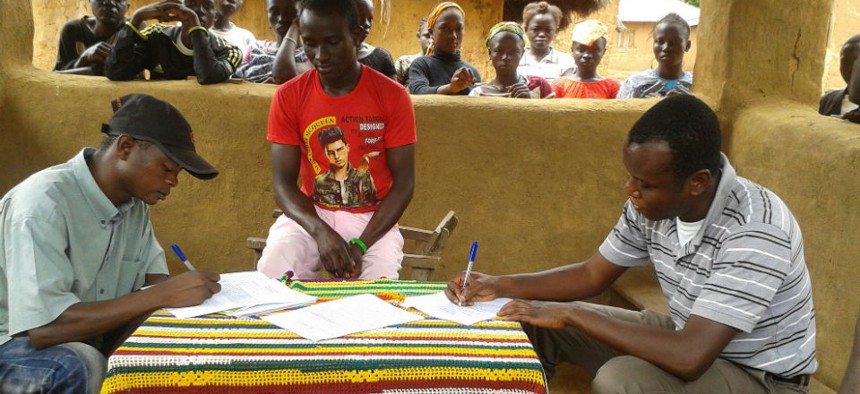
CDC Epidemic Intelligence Service officer Kpandja (KP) Djawe completes daily tally sheets from his contact tracing visit in Guinea. Centers for Disease Control and Prevention
Feds Battling Ebola in Africa Must Work 42 Days Before Bonus Pay Kicks In
For those on temporary assignment, hardship adjustment is not retroactive to their first day in the region.
Federal employees temporarily sent to West Africa to support the U.S. government’s response to the Ebola outbreak do not receive any special pay until after they’ve served 42 days, according to the State Department.
State’s Office of Allowances, which sets pay adjustments and per diems for all federal employees in foreign posts, not just those employed by State, told Government Executive the hundreds of civilian workers temporarily assigned to Liberia, Sierra Leone, Nigeria and Guinea would only start earning a hardship differential on their 43rd day. Only federal civilians in Iraq and Afghanistan earn the bonus pay retroactive to their first day in the location.
According to federal statute, a hardship differential is established “when, and only when, the place involves extraordinarily difficult living conditions, excessive physical hardship, or notably unhealthful conditions affecting the majority of employees officially stationed or detailed at that place.” Living costs are not considered in making the determination.
A civilian employee stationed in Monrovia, the capital of Liberia, where the U.S. military has set up its base of operations for Operation United Assistance, would begin earning an additional 35 percent of their base pay beginning on their 43rd day in the area. The hardship bonuses in Liberia, Guinea and Sierra Leone were bumped up to 35 percent from 30 percent in September. The increases are temporary, however, and are set to expire in March 2015.
In Nigeria, where State and Centers for Disease Control and Prevention employees are also stationed to fight Ebola’s spread, the rate is just 25 percent. The 35 percent differential approved for the three countries where the outbreak is most widespread -- Liberia, Guinea and Sierra Leone -- is the highest bump State can issue under current federal law.
An employee can earn only eight hours of hardship pay per day, or 40 hours per week, even if he or she works 20 hours in a given day, the Allowance Office said.
Federal employees who are transferred to a permanent post in those areas are entitled to an additional cost-of-living allowance, which is calculated as a percentage of spendable income. That pay bump is 25 percent in Liberia, Guinea and Sierra Leone. Permanent employees also can earn an education allowance if their dependent children travel with them.
Civilian feds sent to West Africa earn a per diem as well: up to $285 in Monrovia, $327 in Guinea and $195 in Freetown, Sierra Leone. Employees must submit itemized receipts to receive reimbursements, according to the Allowance Office.
The Secretary of State also could approve danger pay in a given region, but such designations are generally used for areas with “civil insurrection, civil war, terrorism or wartime conditions which threaten physical harm or imminent danger to the health or well-being of an employee.” When danger pay is implemented, hardship pay can be reduced.
The Office of Personnel Management told Government Executive each agency can authorize hazard or environmental pay for their employees. The former is generally awarded to employees enduring physical hardship, such as construction on a tall building, while the latter is defined as employees who are “exposed to a working condition, physical hardship, or hazard of an unusually severe nature.”
Military personnel, meanwhile, can earn up to $400 in bonus pay while deployed in West Africa for Operation United Assistance. The Pentagon provides service members with $150 in hardship duty pay per month and an additional $250 per month in separation allowance for those with dependents.
Both pay adjustments are retroactive to the day of arrival after serving for 30 days, according to Pentagon spokesman Lt. Cmdr. Nate Christensen. There are currently 617 military personnel in West Africa supporting the government’s Ebola response. The Pentagon has pledged at total of 3,900 service members to bolster the operation.







